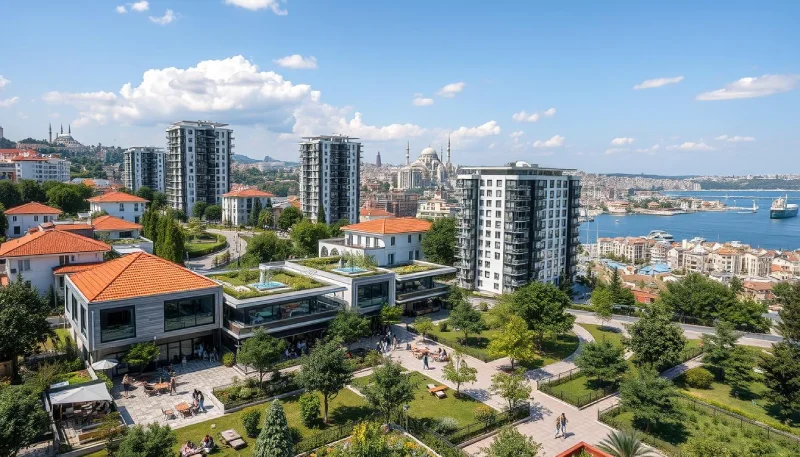
In recent years, Turkey's real estate market has emerged as a promising investment destination, attracting investors from across the globe. As we look ahead to 2025, the market continues to present exciting trends and opportunities for those seeking to expand their property portfolios.
With its strategic location, favorable investment climate, and steadily growing economy, Turkey has positioned itself as a competitive player in the global real estate market. The government's focus on infrastructure development and urban regeneration projects has further bolstered investor confidence, creating a steady demand for both residential and commercial properties.
Investing in Turkey's real estate market offers a range of benefits, from attractive rental yields to the potential for capital appreciation. The country's diverse property market caters to various budgets and preferences, making it an attractive option for both domestic and international investors.
As we delve into the trends and opportunities that will shape Turkey's real estate market in 2025, this article will provide valuable insights and analysis to help investors make informed decisions. Whether you're a seasoned investor or just starting your journey in real estate, exploring Turkey's property market could prove rewarding in the years to come.
Overview of the current real estate market in Turkey
Turkey's real estate market has been a focal point of interest for both domestic and international investors due to its dynamic growth and development. As of now, the market is characterized by a diverse range of property types, from luxurious villas along the coasts to modern urban apartments in bustling cities like Istanbul and Ankara. The rapid urbanization coupled with a growing population has led to an increasing demand for housing, making real estate a lucrative sector. In recent years, Turkey has experienced a significant influx of foreign buyers, drawn by the country’s affordable property prices relative to many European markets, and the potential for good returns on investment.
The Turkish government has implemented various incentives aimed at attracting foreign investment, including citizenship programs that grant citizenship to foreign buyers who invest a certain amount in real estate. This has made Turkey an even more appealing option for those looking to invest in property abroad. As a result, the country has seen a surge in new construction projects, particularly in tourist-heavy areas and urban centers. The increase in infrastructure projects, such as transportation and public services, has further enhanced the attractiveness of the real estate market, making it easier for investors to see the long-term value of their investments.
Additionally, the real estate market in Turkey is supported by a growing middle class and increased consumer confidence. The Turkish economy has shown resilience despite global economic challenges, and this has fostered a positive outlook among potential buyers. In 2023, the market has been buoyed by renewed interest in residential properties, especially in key cities that offer a blend of cultural heritage and modern amenities. With a stable economic environment and positive demographic trends, the real estate landscape in Turkey looks promising as we approach 2025.

Factors driving the growth of Turkey's real estate market
Several factors contribute to the robust growth of Turkey's real estate market, making it a viable investment destination. One significant factor is Turkey's strategic geographical position, acting as a bridge between Europe and Asia. This unique location not only enhances its appeal for business and tourism but also promotes economic ties with various countries. The government’s focus on enhancing connectivity through infrastructure projects—such as highways, airports, and public transport—has been instrumental in driving real estate demand, particularly in areas that are being developed or regenerated.
Another key driver is the favorable investment climate fostered by government policies. The Turkish government has introduced various reforms to streamline the purchasing process for foreign investors, including easing restrictions on property ownership and making the legal framework more transparent. The introduction of tax incentives for foreign buyers has further stimulated the market, leading to an increase in foreign direct investment. Moreover, the government has initiated urban transformation projects aimed at revitalizing older neighborhoods, which not only improves living conditions but also enhances property values.
Additionally, the economic outlook for Turkey remains positive, with growth projections indicating resilience despite global challenges. The construction sector, a significant component of the economy, has been a major contributor to job creation and GDP growth. With interest rates being relatively low, financing options for home buyers have become more accessible. This combination of economic stability, government incentives, and a growing population is expected to sustain the momentum in Turkey's real estate market well into 2025.
Trends and opportunities in Turkey's real estate market for 2025
As we look forward to 2025, several trends are expected to shape Turkey's real estate market. One notable trend is the increasing demand for sustainable and eco-friendly properties. With global awareness of environmental issues on the rise, Turkish developers are beginning to incorporate green building practices and energy-efficient technologies into their projects. This shift not only appeals to environmentally-conscious buyers but also aligns with global trends towards sustainability, creating a niche market for eco-friendly homes and commercial buildings.
Another emerging opportunity lies in the growing popularity of mixed-use developments. These projects combine residential, commercial, and recreational spaces, promoting a lifestyle that accommodates work, leisure, and living in one location. Mixed-use developments are particularly appealing in urban areas where space is limited, and they enhance community engagement by providing residents with access to amenities and services. As urbanization continues to rise, the demand for such developments is anticipated to grow, offering significant investment opportunities for developers and investors alike.
Moreover, the tourism sector in Turkey remains a strong pillar for the real estate market, particularly in coastal regions such as Antalya and Bodrum. The government continues to invest in tourism infrastructure, which is projected to boost property values in these areas. As international travel resumes post-pandemic, demand for vacation homes and rental properties in tourist hotspots is expected to surge. Investors looking to capitalize on the lucrative short-term rental market will find ample opportunities in these regions, making them attractive options for property investment in the coming years.

Analysis of different types of properties in Turkey
The diversity of Turkey’s real estate market means that there are various types of properties available for investment, each catering to different buyer preferences and budgets. Residential properties, which include apartments, villas, and townhouses, are among the most sought-after. In urban centers like Istanbul and Ankara, modern apartments in high-rise buildings are popular due to their proximity to amenities, while coastal areas attract buyers looking for luxury villas with stunning sea views. The residential market is characterized by a range of price points, allowing investors to choose properties that align with their financial goals.
Commercial properties also present a compelling investment opportunity. With the ongoing growth of the Turkish economy, there is an increasing demand for office spaces, retail units, and warehouses. Istanbul, as an economic hub, is witnessing a boom in commercial developments, including shopping malls and business centers. Investors in commercial real estate can benefit from higher rental yields compared to residential properties, making this segment attractive for those seeking long-term returns. The rise of e-commerce has also spurred demand for logistics and warehouse spaces as businesses adapt to changing consumer behaviors.
Additionally, land acquisition for development purposes represents a unique opportunity in Turkey's real estate landscape. As urbanization accelerates, vacant land in strategic locations is becoming increasingly valuable. Investors can purchase land for residential or commercial development, potentially yielding significant returns as the market grows. The government’s focus on urban regeneration has also opened up opportunities for investors to engage in redevelopment projects, revitalizing older neighborhoods while contributing to community development. Understanding the nuances of each property type is essential for investors looking to navigate Turkey's real estate market effectively.
Investment options in Turkey's real estate market
Investing in Turkey’s real estate market offers a multitude of options tailored to different investment strategies and preferences. One popular route is residential property investment, where investors can purchase apartments or villas for rental purposes. This approach not only provides a steady stream of passive income but also offers potential for capital appreciation as property values increase over time. Investors can also consider short-term rental opportunities, particularly in tourist-heavy areas, which can yield higher returns than traditional long-term rentals.
Another investment option is commercial real estate, which includes office spaces, retail outlets, and industrial properties. This sector tends to offer more stable returns, especially in thriving urban areas. For those interested in a more hands-off investment strategy, Real Estate Investment Trusts (REITs) provide an opportunity to invest in a diversified portfolio of income-generating properties without directly owning physical assets. REITs can offer attractive dividends and are an excellent way for investors to gain exposure to the real estate market while minimizing risks associated with direct ownership.
Land investment is yet another viable option, especially in regions designated for future development or urban expansion. Acquiring land at a lower price point can lead to substantial profits if sold or developed in the future. Investors should conduct thorough market research to identify promising locations and assess potential growth. Additionally, partnerships with local developers can facilitate entry into the market, as experienced partners can navigate legal and regulatory complexities, ensuring a smoother investment process. The variety of investment options available in Turkey's real estate market allows investors to align their portfolios with their financial goals and risk tolerance.

Challenges and risks in investing in Turkey's real estate market
Despite the promising opportunities in Turkey's real estate market, potential investors must be aware of various challenges and risks associated with property investments. One significant concern is the volatility of the Turkish economy, which can affect property values and rental yields. Fluctuations in currency exchange rates may also pose a risk for foreign investors, as changes in the value of the Turkish lira can impact returns when profits are repatriated. Investors should stay informed about economic indicators and market trends to make educated decisions and mitigate risks.
Furthermore, navigating the legal landscape can be complex for foreign investors. While the Turkish government has made efforts to simplify the purchasing process for non-nationals, there are still legal and regulatory hurdles that must be addressed. Due diligence is essential to avoid pitfalls such as property disputes, unclear title deeds, or potential zoning issues. Engaging local legal expertise can help investors navigate the intricacies of the Turkish real estate market, ensuring compliance with local laws and regulations.
Additionally, the real estate sector in Turkey can be susceptible to market saturation, particularly in popular tourist destinations. With an influx of new developments, it is crucial for investors to assess supply and demand dynamics carefully. Overbuilding can lead to decreased rental yields and a decline in property values. Conducting thorough market research and working with local real estate experts can help investors identify areas with growth potential and avoid saturated markets. Understanding these challenges is vital for prospective investors to make informed decisions and optimize their investment strategies in Turkey's real estate market.
Achieve Investment Success in Turkey with Antalya Estate Expertise
For those considering investing in Turkey's real estate market, partnering with a reputable real estate agency can significantly enhance the investment experience. Antalya Estate is a well-established agency specializing in the region's property market, offering invaluable expertise and insights. Their local knowledge enables them to provide clients with tailored recommendations that align with individual investment goals, whether it be residential, commercial, or land acquisition. By leveraging their expertise, investors can navigate the complexities of the market more effectively.
Antalya Estate offers a comprehensive portfolio of properties, including luxurious villas, modern apartments, and prime commercial spaces. Their team is dedicated to understanding market trends and identifying emerging opportunities, ensuring that clients are well-informed about potential investments. Additionally, they provide guidance through the entire purchasing process, from property selection to legal documentation, making it a seamless experience for foreign investors.
Moreover, Antalya is a prime location for real estate investment due to its appeal as a tourist destination. With its stunning coastline, rich history, and vibrant culture, the demand for properties in this region remains strong. The agency's in-depth understanding of the local market dynamics allows them to recommend properties that not only offer attractive returns but also provide a lifestyle investment for buyers. By choosing to work with Antalya Estate, investors can position themselves for success in Turkey's thriving real estate market.

Legal and regulatory considerations for foreign investors
Investing in Turkey's real estate market as a foreigner comes with specific legal and regulatory considerations that must be navigated carefully. One of the first steps for foreign investors is to understand the legal framework governing property ownership in Turkey. The country allows foreign nationals to purchase real estate; however, it's crucial to verify that the property is not located in restricted areas, such as military zones. Conducting due diligence through legal counsel can help ensure compliance with local laws.
Additionally, foreign investors will need to obtain a tax identification number from the Turkish tax office, which is necessary for property transactions. This process is relatively straightforward but requires specific documentation, including a passport and proof of residence. Understanding the tax implications of property ownership, including property tax and potential capital gains tax upon selling, is also essential for effective financial planning. Foreign investors should be aware of any applicable tax treaties between Turkey and their home countries that may affect their tax obligations.
Furthermore, it is advisable for foreign investors to engage a reliable local real estate agent or lawyer to assist with the transaction process. This professional guidance is invaluable in navigating legal complexities, negotiating contracts, and ensuring that all documentation is accurate and complete. By being well-informed about the legal and regulatory landscape, foreign investors can mitigate risks and make confident decisions when investing in Turkey's real estate market.
Conclusion: Why investing in Turkey's real estate market is a smart choice for 2025
In conclusion, investing in Turkey's real estate market presents a compelling opportunity for both seasoned and novice investors alike. With its strategic location, favorable investment climate, and a growing economy, Turkey is well-positioned to continue attracting foreign investment. The diverse range of properties available, along with the potential for high rental yields and capital appreciation, makes the market an appealing choice for those looking to diversify their property portfolios.
As we approach 2025, emerging trends such as the demand for sustainable properties and mixed-use developments further enhance the attractiveness of the market. By understanding the various investment options and aligning them with personal financial goals, investors can capitalize on the growth potential that Turkey's real estate sector offers. While challenges exist, the rewards can outweigh the risks, especially when approached with careful planning and expert guidance.
Ultimately, Turkey's real estate market stands as a beacon of opportunity in a rapidly changing global landscape. Whether considering a residential investment in a vibrant urban area or a commercial property in a thriving tourist destination, the potential for success is substantial. With the right strategies and local expertise, investing in Turkey's real estate market could prove to be a smart and profitable decision as we move into 2025 and beyond.